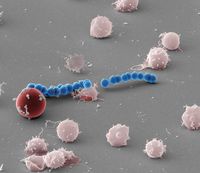New avenues found for treatment of pathogen behind diseases including fasciitis, toxic shock syndrome

One bacterial pathogen is responsible for a range of diseases, from pharyngitis and impetigo to more severe diagnoses such as toxic shock syndrome and necrotizing fasciitis (flesh eating disease), a serious bacterial skin infection that spreads quickly and kills the body’s soft tissue. The pathogen, known as Group A Streptococcus, remains a global health burden with an estimated 700 million cases reported annually, and more than half a million deaths due to severe infections.

